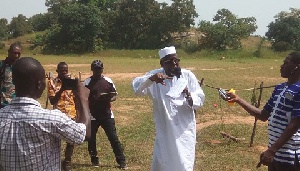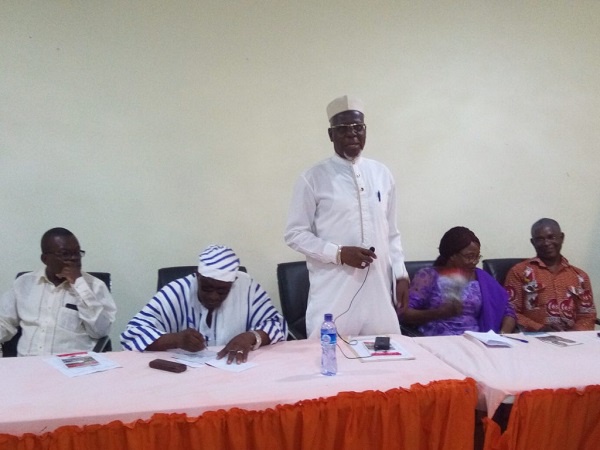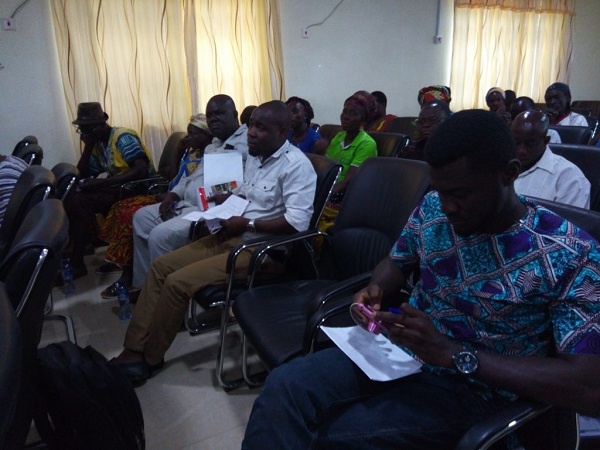 The Minister was speaking at a forum on aquaculture development
The Minister was speaking at a forum on aquaculture development
The Upper East Regional Minister, Rockson Ayine Bukari, has given a strong indication that he does not intend to breach his pledge any day to always respond whenever the public needs his attention but certainly not when he is “on top of” his “woman”.
He was speaking at a forum on aquaculture development organised in Bolgatanga by the Association of Church-based Development Project (ACDEP) in collaboration with the Canadian Feed the Children (CFTC).
“The Regional Coordinating Council’s doors are opened. As a servant of the people, my doors are opened. I’m prepared to serve you. Even if is midnight, if you call me, I will be ready to come out. It is only when I’m on top of my woman I cannot come out,” said Mr. Bukari, who always has streaks of humour in about every public address but often looks serious whilst his audience laugh.
The minister, who is unique for his glowing white-crescent beard and a quick go at issues for which his unwavering admirers call him an “action man” and for which his ardent critics have branded him an “undiplomatic rapper”, is yet not known to have turned down any invitation to grace an occasion— not even the so-called low-profile functions where he is least expected to appear.

He made the remarks whilst reassuring development partners at the forum of his cooperation for the development of a deprived region he took over late in February, this year.
“My doors are opened for you. And I pray that you the technical men will work as a team. When you work as a team, there is nothing that you cannot overcome,” he added.
The forum, which brought together water resources experts as well government officials and fish producers, was themed: “Aquaculture Development in Upper East Region; the Role of Stakeholders.”
The event was meant to sensitise stakeholders on the potentials of aquaculture in the region, for participants to share experiences, to showcase the gains made so far under a project dubbed the Resilient and Sustainable Livelihoods Transformation (RESULT) in the face of challenges and to solicit commitment of all stakeholders to aquaculture development in the region.
A six-year project jointly introduced by ACDEP and CFTC in the Upper East and the Upper West regions to boost up household food security and to enhance livelihoods, the RESULT initiative is reported to have transformed the lives of over 21,000 smallholder farmers and rural dwellers since its takeoff in 2012.

The Regional Minister observed with worry at the forum that fish supply in Ghana had been unacceptably low. Ghana, according to the statistics he quoted, locally produces only 400,000 tons out of the 1 million metric tons of fish it consumes annually.
“Fish is an important food product in Ghana, accounting for 60% of the national animal protein needs of the population. The deficit in fish supply in the country has been the concern of all stakeholders including government, researchers and development partners over the years. The initiative of the RESULT Project to increase fish production in the region to boost incomes of farmers and serve as [an] alternative livelihood support system is, therefore, very laudable and timely,” he observed.
Then, he entreated the private sector to join the fish business to help bridge the chronic deficit in supply.
“As a government, we concede that it would take the collective efforts of all stakeholders to tackle the challenges in the aquaculture sub-sector. As an underdeveloped sub-sector, many opportunities abound which require the involvement of varied stakeholders along the entire value chain. I wish to call on the private sector to consider investing in aquaculture so as to adequately produce fish to meet the widening demand gap,” the Regional Minister appealed.
Upper East Underutilizing its Water Bodies— ACDEP Boss
A number of challenges that confront aquaculture in the region were highlighted at the forum, with specialists also bringing to light some measures taken thus far to address them.
The challenges mentioned were “reduction in water levels, buffer zone invasion with farming activities, underdeveloped market for locally produced tilapia, high-priced feed, predators, input sourcing and poaching” among others.

Making a presentation at the function, an aquaculture specialist with ACDEP, Peter Kwame Akpaglo, announced some containment measures which his outfit had put in place against the threats.
Some of the measures were harvesting water when the water level is still high, sensitisation of water users association on judicious use of water during the off seasons, encouraging grassing and cropping outside the buffer zone to minimise siltation, training of groups on fish processing and preservation methods to provide alternative market for the locally produced fish, provision of predator nets for project communities and provision of security to forestall poaching.
“From our work and studies in the region over the years, what is clear is that we are not sufficiently using our water bodies for economic activities. We spend a lot of money, supported by donors, to do dams— expensive dams— and we allow them to go waste except for livestock watering and construction purposes.
“If we have to make a case for government’s investment in more water bodies in the region, then we have to be able to demonstrate that the current water bodies can be put into economic use. That is where we thought that there are two ways in which we can use the existing water bodies— economic activities in the water, and that is where aquaculture comes in; and economic activities around those water bodies, and that is where the dry-season gardening comes in,” stated the RESULT Project Director, Edward Kapile.